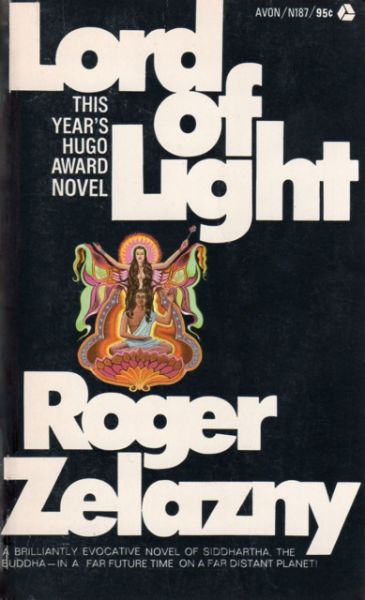Cruel Cosplay
Lord of Light
By Roger Zelazny

6 Mar, 2016
Because My Tears Are Delicious To You
0 comments
I am afflicted with Zelazny-memory-loss syndrome: I have read many books written by the late Roger Zelazny, but for some reason retain little memory of them. It’s not because they are bad books, or even boring books; they’ve been lauded by fans and pros alike. For example, Roger Zelazny’s 1967 standalone novel Lord of Light won the Hugo and was nominated for the Nebula (losing to Delany’s The Einstein Intersection)1. Did I remember anything about it before I picked it up for a reread? Not really.
Well, that’s not completely true. There’s a truly wretched pun in the book: that I remembered, because apparently my brain hates me. And the beginning has always stuck in my mind.
His followers called him Mahasamatman and said he was a god. He preferred to drop the Maha- and the ‑atman, however, and called himself Sam. He never claimed to be a god, but then he never claimed not to be a god.
Sam’s former friends and allies, on the other hand, have been positively eager to claim divine status.
Centuries ago, the immortal crew of the starship Star of India were forced to make a new home on an alien world, a world whose original settlers were in no way keen on being conquered. Armed with advanced technology and impressive mutant talents (also technologically induced), the crew imprisoned some of the natives and massacred the rest. Having won their world, the newcomers taught the remaining colonists and their descendants to regard the crewmembers as gods. Riffing on an older religion, they pretended to be Hindu gods.
It takes a surprisingly long time for the corrupting effects of power to show themselves clearly, but of course eventually they do. The crew controls a technology that enables serial reincarnation, and one faction within the crew resolves to use their control of reincarnation to control society as whole. They also decide to actively suppress high technology, the better to keep the colonists under their thumb.
Not all of the gods agree with this policy. Sam, for example. But all of his attempts to push back at the forces of corruption seem doomed before they begin. Whenever possible, the gods crush Sam’s efforts. When they cannot do that, they do their best to absorb Sam’s movements into the status quo. Sam himself is eventually slated for execution. When he proves curiously difficult to kill, they settle for sending him off to nirvana.
Which you’d think would be the end of the story, except the novel begins with Sam’s retrieval from immaterial exile.…
~oOo~
Roger Zelazny novels could do with a cover sticker warning readers that they shouldn’t expect many female characters; those that do appear will be regrettable. This book tweaks the formula slightly in that there are women-in-men’s-bodies, but I cannot say that Zelazny uses this to explore gender in an particularly imaginative way.
It seems to me there were a number of science fiction novels published around this time in which a starship’s crew lord it over unfortunate colonists (1968’s A Gift From Earth and Rite of Passage would be others). The crew of the Star of India are notable for nastiness above and beyond the 1968 average, which is saying a lot given that the upper classes in A Gift from Earth use their lower classes for parts. For the crew of the Star of India, the oppressed masses include their own offspring. They assure themselves that their subjects are not ready for advanced knowledge — but whose fault is that?
Even though I had read this before, I had completely forgotten that a large chunk of the novel consists of an extended series of flashbacks. It’s a more ambitious structure than I expected, which is odd, because I have read this before. Several times before …
I expect that an American SF fan in the Summer of Love would have found the crew’s appropriated pantheon ultra exotic. Zelazny does appear to have done his research; however, it is always clear that these folks are not really Hindu gods, they are just LARPers. Similarly, when Sam decides to push back by reinventing Buddhism, he isn’t really the Buddha, just someone roleplaying the Buddha. It’s not that surprising their take on the gods is simplified or that Sam is (by his own admission) not much of a Buddha. He is, at least, enough of one for his purposes.
I don’t know why I don’t love this book. It seems like the sort of novel I should have gone nuts over when I was teenager, if only for its rejection of “keeping the masses ignorant for their own good,”, which was as exceptional in 1967 as it is now. No doubt I am just a bad fit for Zelazny due to some defect in my nature.
Lord of Light is available in a number of editions.

1: It’s interesting (at least to me) to compare the Best Novel Hugo and Nebula lists for 1968 (winner in bold):
Hugo
Lord of Light Roger Zelazny
The Einstein Intersection Samuel R. Delany
Chthon Piers Anthony
The Butterfly Kid Chester Anderson
Thorns Robert Silverberg
Nebula
The Einstein Intersection Samuel R. Delany
Chthon Piers Anthony
Lord of Light Roger Zelazny
The Eskimo Invasion Hayden Howard
Thorns Robert Silverberg
How odd that there was actually a day within living memory that Piers Anthony could attract Hugo and Nebula nominations! And while I can see why the Anderson got a Hugo nod, nothing that I have heard about the Howard explains why voters liked it all those decades ago.
